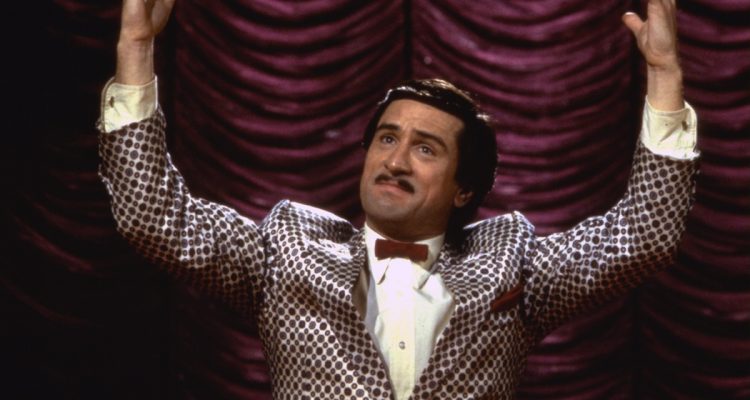 Howard Beale (Peter Finch) in Sidney Lumet‘s “Network” (1976)
Howard Beale (Peter Finch) in Sidney Lumet‘s “Network” (1976)
He may have the most memorable line (“I’m mad as hell and I’m not going to take it anymore”) and it may have been a role that won Peter Finch a posthumous Oscar, but the thing that qualifies Howard Beale from Sidney Lumet‘s “Network” as an antihero, is just what a patsy he is. Buffeted about on the tides of his own manic disorder, and borne up and down by the whims and agendas of other, more coldly calculating characters, Beale is a tragic figure whose weaknesses are manipulated by others to boost TV ratings, and who is discarded (with extreme prejudice) once his usefulness ends. In the (just barely) exaggerated world of Lumet’s fictional TV station, Beale’s fatal flaw is that aside from being clearly in the throes of a breakdown, he is maybe the only honest person there, and his passionate and increasingly lunatic ravings actually come from a genuine if ineffectual desire to see things change. And as long as that plays to an audience, the powers that be, best personified by a sub-zero chilly Faye Dunaway as the cunning, amoral and ambitious Head of Programming, let him rant and rave on. In many ways “Network” is a companion piece to “The King of Comedy” as a biting satire on media consumption, but Beale doesn’t even have Pupkin’s agency. He’s playing a game that he doesn’t understand the rules of, against Grand Masters: he’s destined to lose, and he does.
 Eddie Coyle (Robert Mitchum) in Peter Yates‘ “The Friends of Eddie Coyle” (1973)
Eddie Coyle (Robert Mitchum) in Peter Yates‘ “The Friends of Eddie Coyle” (1973)
What would happen if you took one of those Robert Mitchum characters from a 1940s film noir or crime pic, aged him thirty years, and took away his cool? That’s Eddie Coyle. A brilliant, minor-key riff on (rather than outright deconstruction of) the Mitchum persona of his earlier years, the Coyle featured in the gritty, unglamorised Boston underworld of Peter Yates‘s terrific “The Friends of Eddie Coyle” is so small-time as to be practically minute, and so long in the game as to be practically respectable. Aging and wearying of his crooked career the same way a guy who’s worked in the post office for 40 years might, Coyle does the single least noble thing he can do: in order to stay out of prison he resolves to turn snitch. But in true antihero form, he can’t even do that right — bothersome conscience aside, he ends up fingering guys who’ve already been caught and whose names are no use to the police, and ends up ultimately being set up to take the fall by a more cunning rat than himself. And the fall, when it comes, is so anticlimactic as to be maybe the perfect antiheroic end: passed out drunk, his pants soiled from a dropped beer that looks like a urine stain, Eddie is shot in the head in a moving car, before it and his body are abandoned in the parking lot of a bowling alley. It’s one of Mitchum’s greatest performances, because for a guy whose stock in trade was the laconic, morally ambiguous guy with a palpable air of danger, with Eddie Coyle he manages to turn down the volume on that bristling charisma, and show us someone not just broken, but desperate.
 Mark Zuckerberg (Jesse Eisenberg) in David Fincher‘s “The Social Network” (2010)
Mark Zuckerberg (Jesse Eisenberg) in David Fincher‘s “The Social Network” (2010)
Lest for a moment you think all antiheroes have to lose, let’s talk about one who wins, and wins big. Mark Zuckerberg, as portrayed by Jesse Eisenberg in “The Social Network,” is a textbook example of the guy you dislike, who you kind of hope to see brought low by his hubris and self-importance, but then that poetic thing happens where his self-importance is proven to have had actual foundation, and so actual importance (and wealth and fame and all the trappings) follow. The sharp, satirical bent of Aaron Sorkin‘s script and the leanness of David Fincher‘s direction took what could simply have been a biopic, or a topical news story-turned-movie, and turned it instead into something vital and unnerving — a comment on our modern times, and a pretty scathing one at that. But it’s Eisenberg’s Zuckerberg who is the great creation here, by turns manipulative and Machiavellian, and then socially inept and pathetic — he’s the ultimate loser-who-wins. And at the heart of his psychology is the fascinating push-pull shared by many of the antiheroes on our list: a broad streak of self-loathing that manifests itself as self-love. So perhaps that’s the reason the character still passes the Pupkin test: we might covet his power and influence and ludicrous wealth, but would any of us really want to wake up in the morning and be that character (not the real-life guy; that’s another question), with all the mortifications and pettinesses and jealousies we read into him?

